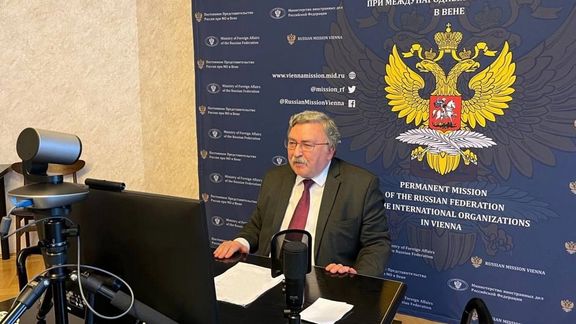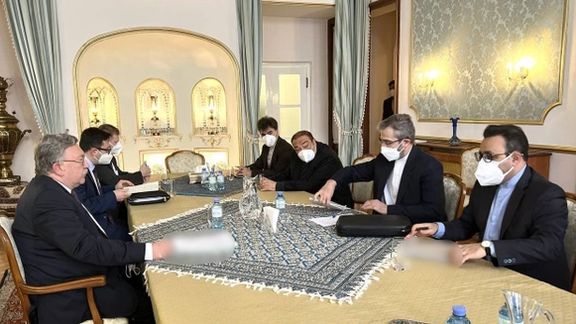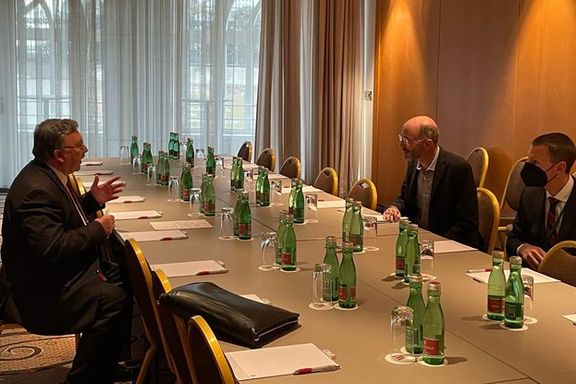Russian Envoy Says Iran Not Going Nuclear Now Unless Provoked

Russia’s envoy to the International Atomic Energy Agency (IAEA) told Iran International Friday there was “still time” to save the 2015 Iran nuclear deal.

Russia’s envoy to the International Atomic Energy Agency (IAEA) told Iran International Friday there was “still time” to save the 2015 Iran nuclear deal.
“It’s feasible, it’s doable,” Mikhail Ulyanov said. The ambassador claimed agreement between Iran and world powers was “99.9 percent” achieved when talks broke off March 10.
"We were five minutes from the finishing line,” he told Iran International Fardad Farahzad in a video interview.
After year-long negotiations to revive the 2015 deal, known as JCPOA, stopped in Vienna, it became clear that Iran and the United States had significant differences over what sanctions would be removed once an agreement was inked. Iran insisted that its Revolutionary Guard should be removed from the US list of terrorist organizations, a demand Washington has refused.
Ulyanov condemned the resolution passed Wednesday by the IAEA board criticizing Iran, which he said was "counterproductive" and "illogical at a very delicate moment in the Vienna talks when the final outcome is in question.” On Thursday, Ulyanov had called the Western move “stupid”, but in the he told Iran International that he should not have deviated from diplomatic language.
The resolution tabled by the United States, United Kingdom, France and Germany passed overwhelmingly, leaving only China and Russia as countries voting against.
Resolutions were passed by the 35-member board, Ulyanov argued only “on rare occasions and is perceived as something extraordinary as a rule.”

The ambassador denied the situation with Iran – including its growing stockpile of uranium enriched to 60 percent and its continuing restrictions of IAEA monitoring - was extraordinary.
“It’s not urgent,” he said. “We are talking about uranium particles which belong to the beginning of this millennium [work carried out by Iran before 2003]…nobody can insist that these particles represent any proliferation risk.” Tehran had provided some information to the IAEA, he added, including over uranium metal, so that “progress is there.”
But the IAEA thought otherwise when on June 6 its director Rafael Grossi submitted his report to the Board of Directors saying, “Iran has not provided explanations that are technically credible in relation to the Agency’s findings at three undeclared locations in Iran.”
Iran and the IAEA had agreed in March that Tehran would fully answer questions about its past nuclear work by mid-June, and the UN nuclear watchdog concluded that there was little progress in that respect.
Ulyanov insisted that the passage of the resolution had led to Iran’s “retaliatory measures” in informing the IAEA it would remove further monitoring equipment. This, he said, had confirmed his assessment expressed before the resolution was raised.

“I could not understand the logic behind this initiative of my western counterparts. I must tell you that last year they tried to do something like those three times – in which case the Russian Federation managed to convince them not to take this step.”
Such persuasion was more difficult in the current climate, Ulyanov conceded, obliquely referring to tensions over Ukraine.
Moscow remained committed, he insisted, to the 2015 nuclear deal (the JCPOA, Joint Comprehensive Plan of Action) as a “great achievement in the field of” non-proliferation.” He said that the current state of Iran’s nuclear program did not bring Tehran as near to nuclear weapons as some suggested.
“Russia is the strongest supporter of the nuclear non-proliferation regime…we don’t want the so-called ‘nuclear club’ [those states possessing nuclear weapons] to be extended… Speculations about so-called ‘break out time’ [the time it would take Iran to develop a bomb]…are not helpful…If Tehran obtains a sufficient amount of nuclear material – if they don’t have it at this stage – then they will [still] need to produce a nuclear warhead, which will take a lot of time, even if a political decision is taken in this regard.”
However, not all Iranian research and military sites are under international monitoring, and no one can be sure how quickly it can assemble a weapon once it has sufficient fissile material. By most accounts, Iran either already has or will soon amass enough enriched uranium for one or maybe two bombs.
The ambassador noted that while aspects of the Iranian nuclear program were “rather sensitive” that “at this stage we have no reason to believe Iran is looking for nuclear weapons…at least nobody has proved such an allegation.”
Ulyanov argued that Iran, while enriching uranium to 60 percent was not enriching to ‘weapons grade” [90 percent]: “To the best of my knowledge, at this stage they are not going to do that, unless somebody from outside provokes them to take some risky steps.”
But critics of the talks say that as Iran has dragged out the talks it has engaged in nuclear brinksmanship, advancing its program, while claiming it is not after weapons.